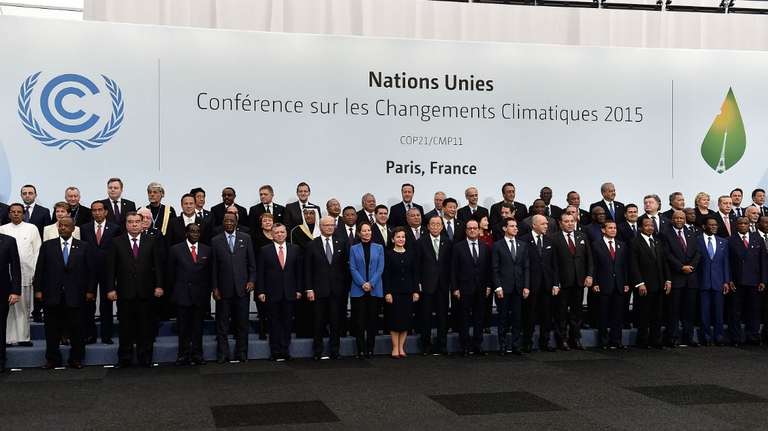
The 26th edition of the United Nations Climate Change Conference, COP26, will be held in Glasgow, Scotland in November 2020. The pre-COP will take place in Milan, Italy.
Una nuova versione dell’accordo tra i 196 governi della Cop 21 è stata pubblicata mercoledì. Ancora molto il lavoro da fare nelle ultime ore di negoziati.
A new version of the draft agreement has been handed to COP21 President, Laurent Fabius, shortly after 3 p.m. on 9 December. Since then, the final rush has begun. Problems have to be solved by Friday as the latest, but there are still plenty of them, as demonstrated by 20-some options and 350 square brackets (indicating areas of disagreement).
#COP21 – Sit-in des ONG pr demander +d’ambition: financements #climat, solidarité pr les pays vulnérables pic.twitter.com/18IQpfLVna
— Oxfam France (@oxfamfrance) 9 Dicembre 2015
The new version is made of 29 pages: it is thus a document significantly more simple than the previous versions. The team of 14 facilitators has worked on it during the night between Tuesday and Wednesday. Nevertheless, some key issues still need to be solved. First of all, funds. Secondly, the dates of the review of the INDCs, the pledges submitted by governments ahead of the conference to cut CO2 emissions. According to numerous NGOs (which can participate in negotiations at the request of ministers only), INDCs should be reviewed as soon as possible, whilst the draft agreement cites just a “facilitator meeting” to be held in 2018 and the effective revision just a few years later.
Grosse action #cop21 @karinegavand @Romina_Sfrche @anabella_tu @ClimatAlix @RomainBenicchio @Fredericamiel pic.twitter.com/HKctoAJc7E
— Sarah Fayolle (@SarahFayolle) 9 Dicembre 2015
Most important, all options on the main goal of COP21 are still present, i.e. if limiting the global average temperature rise to 2°C (as set ahead of the conference) or to 1.5°C (as asked by associations and countries most affected by climate change).
“The risk is to compromise on the agreement, and the result would be a deal unable to push the world in the right direction,” said the Réseau Action Climat. “Yes, options and square brackets have decreased. Yes, the possibility to limit the average global temperature rise to 1.5 hasn’t been cancelled. But funds and road maps to achieve the goals lack. And the review mechanism of INDCs is still too weak and delayed”.
For all these reasons, as the coordinator Célia Gautier said, “the Paris agreement – if deprived of its vital functions – will favour those who fight for their right to pollute. A paper of that kind would be unacceptable”. “We’re still far from the objective, and there are only 24 hours left,” said François Juillard of Greenpeace.
Ermete Realacci, Honorary President of Legambiente, is more optimistic: “It’s pretty clear that the agreement won’t be perfect. But I believe it will be reached. This means that, at least, the world has taken the first step”. Moreover, Mariagrazia Midulla, Climate and Energy Responsible at WWF Italia, said that “We have all ingredients for positive results, but governments will have to work day and night to avoid the risk of a façade agreement”. Federico Brocchieri, Coordinator of the Italian Climate Network Project, underlined that “As for INDCs and funds, there’s still a lot to do. 100 billion dollars are needed, considering that only 10 billion have been found last year”.
Trattativa tutta la notte, nuovo testo domani pomeriggio alla #COP21 (dovrebbe essere il penultimo ) https://t.co/PT8rTbDHq4
— Mariagrazia Midulla (@MgMidu) 10 Dicembre 2015
A new version could be published today, 10 December. Facilitators continued to work until 5 a.m. and started again at 8 a.m. In any case, Fabius has more than once said that works must be imperatively ended by Friday. The next few hours will be decisive.
Siamo anche su WhatsApp. Segui il canale ufficiale LifeGate per restare aggiornata, aggiornato sulle ultime notizie e sulle nostre attività.
![]()
Quest'opera è distribuita con Licenza Creative Commons Attribuzione - Non commerciale - Non opere derivate 4.0 Internazionale.
The 26th edition of the United Nations Climate Change Conference, COP26, will be held in Glasgow, Scotland in November 2020. The pre-COP will take place in Milan, Italy.
Thanks to activists, the voice of the world’s peoples resounded through the COP25 like an alarm bell. Governments didn’t reach the results they demanded, but their cries and messages were stronger than ever, reaching even those who weren’t in Madrid.
Climate change poses a risk for millions. However, women are the most vulnerable to its negative consequences: a few simple considerations by the Italian Climate Network help us perceive the global implications of this.
The COP25 ended two days late and with very few steps ahead made. Climate negotiations in 2020 will be an uphill battle as political will clearly seems to be lacking, once again.
The last ten years have been the most “exceptional” and hottest decade ever, with extreme weather hitting people and ecosystems harder and more frequently. 2019 is also on course to becoming the second or third hottest year since records began.
Unite Behind the Science: this was the title of the conference held at the COP25 on 10 December. Greta Thunberg’s presence filled the arena, but this time it was scientists’ turn to speak.
25,000 delegates meet for the COP25 from 2 to 13 December. What can we hope this UN climate change conference, whose venue was changed from Santiago de Chile to Madrid, will achieve?
100 eminent people from all over the world, including Vandana Shiva, Naomi Klein and Noam Chomsky, have signed an open letter after the disappointing results of the COP24. A call-to-arms for climate against world leaders’ indifference.
The outcome of the COP24 in Katowice left many unsatisfied. Greta Thunberg, a young Swedish environmental activist, gave a harsh, heartfelt speech addressing world leaders.








